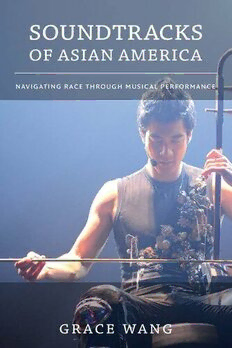
Soundtracks of Asian America: Navigating Race through Musical Performance PDF
Preview Soundtracks of Asian America: Navigating Race through Musical Performance
Soundtracks of Asian America Soundtracks of Asian America navigating race through musical per for mance Grace Wang duke university press Durham & London 2015 © 2015 Duke University Press All rights reserved Printed in the United States of America on acid- free paper ∞ Typeset in Chaparral Pro by Westchester Publishing Services Library of Congress Cataloging- in- Publication Data Wang, Grace Soundtracks of Asian America : navigating race through musical per for mance / Grace Wang. pages cm Includes bibliographical references and index. isbn 978- 0- 8223- 5769- 8 (cloth : alk. paper) isbn 978- 0- 8223- 5784- 1 (pbk. : alk. paper) 1. Asian Americans— Music—Social aspects. 2. Asian American musicians. 3. Ste reot ypes (Social psychology)— United States. I. Title. ml3560.a85w36 2 014 781.89'95073—dc23 2014020687 ISBN 978-0-8223-7608-8 (e-book) Cover art: Leehom Wang performing in Langfang, Hebei Province, China, 2012. Photo courtesy of Hongsheng Artist Management. For my family contents introduction | Soundtracks of Asian America 1 one | Interlopers in the Realm of High Culture: 28 “Music Moms” and the Per for mance of Asian Diff erence two | “Th is Is No Monkey Show”: 64 Racializing Musical Per for mance three | A Love Song to YouTube: 101 Celebrity and Fandom Online four | Finding Sonic Belonging Abroad: 143 Reimagining Chinese American Subjectivities through Diaspora epilogue | Enter the “Tiger Mother” 186 ac know ledg ments 193 notes 195 bibliography 245 index 257 introduction Soundtracks of Asian America [Music] both articulates and off ers the immediate experience of collective identity. Music regularly soundtracks our search for our- selves and for spaces in which we can feel at home. —Simon Frith, Performing Rites In Lan Samantha Chang’s novella Hunger (1998), Tian Sung, a Chinese violinist, fl ees China for the United States to pur- sue his musical dreams. Leaving behind home and family, he escapes in the dark of night by swimming out to sea— violin held precariously above water— until a cargo ship takes him aboard en route to Taiwan. From there, Tian earns a visa spon- sorship to continue his music training in New York City. He practices diligently, pinning all his hopes on securing a full- time position at a prestigious music conservatory. Still, despite his musical talent and prodigious work ethic, he fails to gain a teach- ing position. Disillusioned and unwilling to compromise by working at a “lesser” institution, Tian gives up playing the violin. Resigning himself to the unskilled labor of bussing dishes and chopping vegetables at a local Chinatown restau- rant, he transfers all of his dreams and ambitions onto his young est daughter, Ruth. Tian’s daughter takes to the violin quickly and shines as a young prodigy. But as a teenager, over- whelmed by her father’s relentless pushing and expectations, Ruth rebels and runs away from home. By the end of Hunger, Tian is crushed—s hattered by the weight of carryi ng dreams of “such fl agrant and extravagant design.”1
